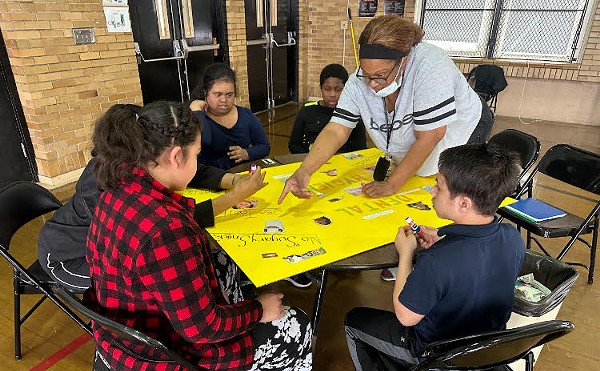After nearly four decades at the forefront of the evangelical Christian movement to “cure” people of homosexual attraction and behavior, last week Exodus International abruptly announced that the organization would shut down, with president Alan Chambers releasing a statement apologizing to the LGBT community for the damage they have caused.
In the statement, Chambers said that while he does not apologize for his biblical beliefs on homosexuality or the good work that his organization accomplished, he acknowledges the pain and trauma that Exodus and their affiliates have caused for those promised a cure of their same-sex attractions and the villainization of the LGBT community that sprung from their work.
“Friends and critics alike have said it’s not enough to simply change our message or website,” wrote Chambers. “I agree. I cannot simply move on and pretend that I have always been the friend that I long to be today. I understand why I am distrusted and why Exodus is so hated.”
The move by Exodus follows years of evolution, as they recently shunned their previous belief that same-sex attraction could be “cured,” instead focusing on preventing people from acting on those urges. This change was brought about by hearing stories of abuse and harm toward those “treated” — including increasing incidents of suicide — and the overwhelming consensus of scientific research and professionals that such attraction could not simply be “prayed away.”
While Exodus’ folding was celebrated by LGBT-rights advocates, many evangelical leaders — such as Albert Mohler of Louisville’s South Baptist Theological Seminary — denounced Exodus’ actions as “capitulation” and “a surrender to the cultural currents of the day.”
“The normalization of homosexuality contradicts the Bible’s consistent condemnation of all same-sex sexuality as sin,” said Mohler to Baptist Press. “The rejection of the hope for change for homosexuals indicates a tragic loss of confidence in the Gospel of Jesus Christ.”
LEO Weekly spoke with two Louisvillians who have first-hand knowledge of the so-called “ex-gay therapy” of Exodus, neither of whom is mourning their demise. One is the director of an Exodus affiliate who plans to continue his ministry, the other a survivor of the torment of “reparative therapy” to “cure” him of homosexuality, which almost wound up killing him.
In 2008, Daniel Mingo founded Abba’s Delight — no relation to the 1970s Swedish pop band with a large gay following — in Louisville, whose website claims to offer Christian ministry to the “sexually broken” who struggle with “unwanted same-sex attractions” and “lifestyles incompatible with biblical teaching on sexuality.”
In an email exchange with LEO, Mingo says that Exodus’ decision was for the best, and while they will be missed, their absence will lead to “other possible avenues for the future of ministries who are available to those who seek their assistance.” He says Exodus’ apology was necessary due to the reluctance of the church-at-large to apologize for the pain it has caused the gay community by much of their hurtful rhetoric.
“We are not here to turn them from gay to straight, and not here to change their attractions,” says Mingo. “We tell them we are here to point them toward Jesus and to learn to live the biblical standard of a sexually pure life, whether they are married or single.”
Mingo — who declined to say how many people Abba’s Delight serves in the region — says they only minister to Christians who initiate contact. Parents send their children to the ministry, but he says they only serve teens “who themselves want assistance.” Mingo adds that Abba’s Delight has no licensed professional counselor on staff — which is not a substitute for professional treatment and therapy — and “when the need arises, (we do) have referral resources available.”
Shortly after being “saved” at his church in 2002, 12-year-old Benjamin Berry came out to his parents as gay. He read the Bible front to back, and when he came across Leviticus 18:22, he realized this “abomination” described his private feelings. With the encouragement of his distraught family, Berry went to his church for help, where a priest referred him to a Sexaholics Anonymous group.
“They were telling me the same thing that my church had preached from the pulpit, that as long as I have the feelings that I have, I can never be right with God,” Berry tells LEO.
After a call to Exodus International and advice from two more priests, Berry was referred to a series of therapist groups that met at various churches.
“That’s what’s really confusing about groups like Exodus,” says Berry. “They hardly ever have their own inside people or groups. What they tend to do is affiliate themselves with fundamentalist preachers and therapists and refer you to them if you call Exodus. It was all very, very secretive, not publicized really at all.”
When Berry was 16, he says his priest told him he knew of a therapist who could finally cure his “unwanted same-sex attraction,” but to do so, “he needed to put me under the confessional seal. He told me, ‘Secularly it’s not legal, but spiritually it’s necessary.’”
At the therapist’s home, Berry says, “He would show me gay pornography and shock me, then show me heterosexual porn and not shock me. It was essentially torture.”
Berry says that priests also encouraged him to self-flagellate — “like the saints did to discipline their bodies to silence the sinful lust” — which he did with a homemade whip fashioned out of his belt and his “mother caught me doing a number of times.”
After high school — filled with shame for his “failure” to be “cured” — Berry started to abuse alcohol and attempted suicide three times.
Berry soon removed himself from the therapy and came out as gay. He has now been sober since 2010 and volunteers with Catholics for Fairness.
“I don’t think anything could fix the harm that Exodus has done, but I’m very glad that no more kids are going to be harmed through Exodus anymore.”
Berry sees little distinction between the “conversion therapy” he went through and the “kinder, gentler” approach of Abba’s Delight. (Berry adds that he was never treated by or even heard of Mingo or his group.)
“Both still give the message that LGBT people are in some way flawed or sinful for being who they are,” says Berry. “Both approaches make one feel less than and foster a sense of depression and frustration that all too often leads to despair and self-harm.”
Chris Hartman, director of the Fairness Campaign, agrees that the continued presence of Exodus affiliates such as Abba’s Delight will only perpetuate more harm to the LGBT community.
“I find it terrifying, desperate and sad that an outdated, harmful ministry like Abba’s Delight would seize upon the opportunity of Exodus’ exeunt to advertise its own services, which, by Abba’s own admission, lack licensed professional counseling,” Hartman says.
While Berry says that some in his family still struggle accepting his sexual orientation, his 20-year-old sister goes to Pride events and rallies with him, including the Kentuckiana Pride Parade in Louisville last week. With public opinion rapidly changing in favor of LGBT rights and acceptance, and the possibility of landmark decisions by the Supreme Court this week on marriage equality, Berry says he’s optimistic that fewer children will have to go through the ordeal he went through.
“Even my little sister, who is almost 8, doesn’t see anything wrong with me having a boyfriend,” says Berry. “Her generation is going to be different.”





